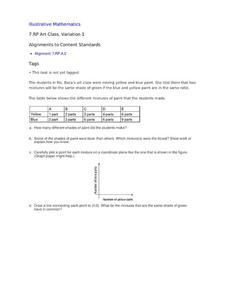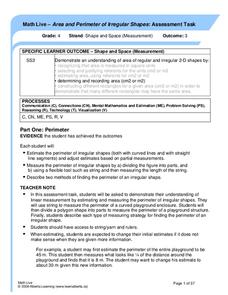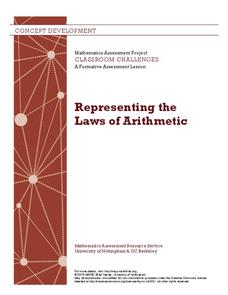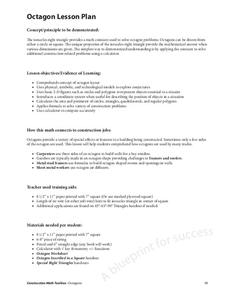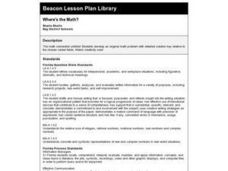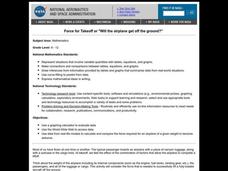Curated OER
Fractions, Decimals, and Percentages Got You Down? "Tri" This!
Students explore number sense by creating a math presentation in class. In this parts of a whole lesson, students define and discuss the relationship between fractions, decimals and percentages before completing a problem worksheet in...
Curated OER
Learning Unit: The Pythagorean Theorem
Middle and high schoolers research the life of Pythagoras and the Pythagorean theorem. They write a short biography of Pythagoras and learn to apply the theorem in their study of right triangles.
Curated OER
Measurement: Finding Areas of Rectangles
Gardening geometers construct the formula for the area of a rectangle by viewing a video revolving around two young people, their lawn mowing business, and their need to charge by the square meter. A relevant real-life application lesson!
Curated OER
Chances Are......You're Right
Young mathematicians study probability. In this math lesson plan, learners calculate odds, and convert those into percentages of probability. Fractions are also used, making this lesson plan quite rich in some of the more difficult...
Curated OER
Ratios And Scale
students investigate the concept of using a ratio in the work of construction and solve problems using real life applications. They read descriptions of how various types of construction professionals use ratios on the job. The lesson...
EngageNY
Analyzing Graphs—Water Usage During a Typical Day at School
Connect your pupils to the problem by presenting a situation with which they can identify. Individuals analyze a graph of water use at a school by reasoning and making conclusions about the day. The lesson emphasizes units and labels of...
NASA
Lights on the International Space Station
Groups explore illumination with NASA's Lighting Environment Test Facility (LETF) as a context. Using the TI-Nspire app, groups determine the lux equation that models their simulation. They then use the lux equation to solve problems...
EngageNY
Comparing Linear and Exponential Models Again
Making connections between a function, table, graph, and context is an essential skill in mathematics. Focused on comparing linear and exponential relationships in all these aspects, this resource equips pupils to recognize and interpret...
Curated OER
Art Class, Variation 1
Student statisticians calculate ratios to determine how many shades of green were mixed by Ms. Baca's art class. They graph the number of blue parts against the number of yellow parts for each combination and discover that some produce...
Illustrative Mathematics
Ratio of Boys to Girls
How many boys are in the class? Here is an introductory exercise describing ratios. The commentary shows different ways learners can approach the problem, using a tape diagram of boys to girls and using a table. The activity includes...
Alberta Learning
Area and Perimeter of Irregular Shapes
Evaluate young mathematicians' understanding of area and perimeter with this series of three assessment tasks. Challenging students to not only calculate the area and perimeter of irregular shapes, but to explain in writing their...
Mathematics Assessment Project
Representing the Laws of Arithmetic
Sixth graders connect numerical expressions to geometric area. They first complete an assessment task requiring them to identify area models for numerical expressions. Learners then participate in an activity to match area models to...
Curated OER
Academic Challenge
Students apply their knowledge of math to the real world. In this algebra activity, students explore different way to incorporate math topics into the real world. They create a score or progress sheet to mark their progress.
Curated OER
Triangles in My Life
Tenth graders investigate where in the real world triangles are used. In this geometry lesson, 10th graders write an essay describing where in their lives triangles are used. They can use food, buildings, clothing or anything triangular...
Curated OER
Triangles
Fourth graders participate in three experiments to gain understanding of triangles. In this triangles lesson plan, 4th graders use pipe cleaners to create bubble pipes, basketball hoops and bingo cards to display the characteristics of...
Curated OER
Octagon Lesson Plan
Students investigate octagons using words and shapes. In this geometry lesson, students discuss the shape of an octagon using physical and symbolic models. They make conjecture about the shape and relate it to the real world.
Ohio Department of Education
I Can Name that Angle in One Measure! - Grade Eight
Collaborative groups work with geometry manipulatives to investigate conjectures about angles. They create a graphic organizer to use in summarizing relationships among angles in intersecting, perpendicular and parallel lines cut by a...
Curated OER
Teaching with Collections
Young scholars examine collections. In these real-world collections lessons, students examine and describe buttons and shells. Young scholars will then sort, classify, and graph items according to various indicated descriptors.
Curated OER
Math in My World
Third graders record in their journals the many ways in which mathematics is part of their world.
Curated OER
The Math Connection
Fourth graders investigate where math is used in real world situations in this unit. Students engage in a variety of activities in order to determine how and where math is used in the business world.
Curated OER
Garden Variety Geometry
Learners prepare to take the GED by reviewing basic math concepts. In this geometry lesson, students review vocabularies such as formula, perimeter, circumference and other important geometric terms. They convert between the English and...
Curated OER
Connecting Math to Our Lives
Students participate in an online interactive forum to explore how math is used in their families and communities. They design games to submit to other students online, and identify and organize data to solve the problems from other...
Curated OER
Where's the Math?
Fourth graders create an original math problem with a detailed solution key relative to their chosen career fields.
Curated OER
Math: Will The Airplane Get Off the Ground?
Students use data from real-life models to calculate and compare the force required for an airplane of a given weight to become airborne. They use a graphing calculator to evaluate data and use the World Wide Web to access data.










